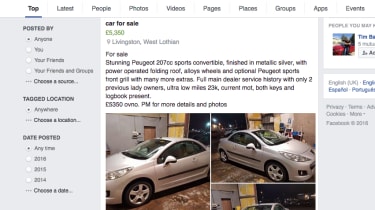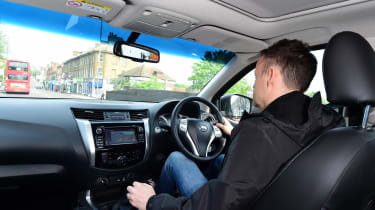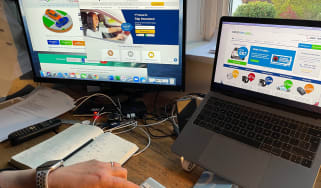Buying a car privately: tips, advice and your rights
Buying a car privately can be daunting, but follow our advice to get the best deals with the least hassle

Buying a used car from a private seller should not be a daunting or stressful experience; in fact, it should be a straightforward process which could save you money when compared to buying from a dealer that has bills to pay and profits to secure. The classifieds are rife with privately owned cars ready to be sold – often from owners who have a new car on the way so there could be more room for haggling before securing a deal. However, there are some key tips and advice you need to consider before handing over your cash for a second-hand car, and we’ll take you through them below.
It is important to remember that carelessness when buying a used car privately could end up costing you more than what you paid for the car as you won’t be getting the same protections as you would get from a garage - especially where warranties, breakdown cover or consumer rights are concerned.
Which is why we’ve compiled this guide to buying a car privately, covering a range of aspects from used car prices and car valuations, through how to spot a car trader masquerading as a private seller, and avoiding a dodgy car or finance deal. To keep things simple, we’ve broken the process down into three basic steps:
- Finding your car
- Viewings, inspections and test drives
- Making the purchase
So follow our advice, and you’ve a great chance of driving off happy with a good quality used car from a private seller. Read on for more…
1. Finding your car
Finding a car might seem like a simple task, but there are plenty of traps, scams and dodgy cars up for sale which could be very costly…
Top sources of privately owned cars for sale
There are many classified ad websites listing 1,000s of used cars, and by law, all adverts have to make clear whether the advert is from a private seller or a used car trader or dealer. So if you want to buy privately, the first step is to filter out the kosher trade ads on your classified website of choice. Sellers trading illicitly – trying to avoid the taxman or trying to make a fast buck on the side – are a little harder to spot, but we'll come to that later.
There are some more traditional ways to search for a second-hand car, too – some people advertise with cards in shop windows or on supermarket notice boards, while others favour a ‘for sale’ sign stuck on the window of the car in question. You can even be a little bit proactive if you know what you're looking for. A ‘wanted’ post on social media, in motoring forums, or even putting the word out at the office can turn up good results.

Know the market
Cheap cars for sale are always interesting, but they’re always cheap for a reason. If you’re lucky, the vendor may be after a quick sale and the car is priced to sell quickly, or you could find that the owner doesn’t know the value of the car. It could also be because the age, condition, or history of a vehicle means it’s not worth more. Knowing the market means having an idea of used car values in the segment you’re looking at, so you know what to expect for the money you want to spend. Be prepared to pay a fair price for the vehicle and condition you want, as you’ll likely be happier in the long run.
What to look for in a classified car advert
Information is key – avoid adverts that are scant on details, as they may indicate a careless or lazy seller, and that doesn’t inspire confidence. A good ad should include:

- Make, model, engine size (and name), plus trim level.
- The number plate year identifier
- Date of last MoT/remaining months of MoT
- Last service date and service history
- Colour and type of paint finish
- Standard equipment/option highlights
- Where and when the car can be viewed
- A contact telephone number
- The asking price
- Clear and detailed photos
Make a shortlist
Once you’ve got a feel for the market values, and the type and condition of vehicles available, you’ll be able to make a shortlist of the cars you’d like to view. If you’re buying a mainstream model, there should be a ready supply of cars appearing on the market constantly. So take your time to look around, and don’t feel pressured to buy the first one that looks OK. If you’ve a very specific requirement for something rare and in high demand, then you may have to be a little bolder.
2. Viewings, inspections and test drives
Buying a used car sight unseen can be risky and is something you should avoid. Getting a good look at a car in the metal, alongside a test drive, is key.
Thorough checks before you buy will pay dividends later
So you’ve whittled your list of ‘possibles’ down to the adverts you like the look of most. Now it’s time to get serious, and really focus on the crucial details. Remember, you’re not just going to prod and poke a (hopefully) gleaming car – this is also your chance to assess the vendor’s trustworthiness, and make sure the car’s history and credentials are as sound as the bodywork and running gear.
Evaluating the vendor
You should expect to be able to view a used car that’s for sale privately at the home of the vendor – which should also be the address printed on the car’s V5 logbook. Any suggestion from the vendor that you might view the car elsewhere should set off alarm bells, so be prepared to be extra cautious. It has been known for fraudsters to wait on the pavement outside an address, to make you think they live there.

Does the vendor have proof of identity that shows they are the rightful owner of the car you’re looking at? Or is the vehicle’s own identity uncertain? A reasonable and honest vendor should accept and respond to all reasonable enquiries in good faith, so steer clear of those who appear impatient or reluctant to provide relevant details. They may be traders attempting to pass off a sale as ‘private’, or worse, they may be seasoned criminals or fraudsters. You may never know, but it’s just not worth taking a risk when there are so many other cars to look at instead.
Inspecting and test driving the car
It’s critical that the car you are buying is in sound mechanical and structural condition, and you also need to make a properly informed appraisal of its cosmetic condition in order to make sure it’s advertised for a fair price.
Test driving the car is key. Following a used car checklist when driving a car for the first time can help you stop falling into any potential traps. A thorough test drive will also give you the opportunity to get a feeling for how a car drives and if it’s right for you. You can listen for any knocking sounds from the engine bay, brakes or suspension, too.
The car should not pull to the side when on a level road, and the controls should be responsive. It’s worth looking out for clunky gear changes in automatics, or heavy clutch pedals in manuals as these could all be warning signs that expensive repairs might be imminent. If you are in any doubt, getting an inspection from a garage is advised. For the equivalent price of a tank of fuel, it could end up saving you hundreds of pounds and headaches down the line.
Before getting behind the wheel, you’ll need to make sure you have the correct insurance when driving someone else's car. Your current insurance policy may allow for temporary insurance, or you may have to arrange for cover through a ‘temp cover’ company.
Checking car history and paperwork
Make sure all the documents are in place – that means proof of ownership such as a purchase receipt in the name of the vendor, plus the vehicle V5 logbook and MOT. Now is your chance to make sure the numberplate and VIN (chassis number) match up on the vehicle and the paperwork. The car’s VIN plate is usually visible at the base of the windscreen, but on older cars may be underneath the bonnet or stamped elsewhere on the bodywork. Also, don’t forget to check the mileage on the MoT or logbook against the odometer.
Unless you are extremely confident in the car’s provenance and history, it’s also a good idea to invest in an HPI car report as it will be able to back up and confirm the information provided by the vendor, or it will flag up any potential issues.
3. Paying for your new car
So you’ve found a car that ticks all the boxes, from a credible vendor who’s happy to shake hands on your offer price. If you can’t hand over cash right away – and it’s perfectly normal not to carry wads of notes when viewing a car – it’s best to be ready with a significant deposit. £50 should be enough to reassure the vendor that you’re serious, and make sure he doesn’t show the car to other buyers while you finalise the funding. Make sure you agree the timeframe in advance, too, as keeping a vendor waiting for the money can lose you a deal.
Cash payments
Safe, swift and easy, cash can be a compelling argument when you want a vendor to accept a lower than advertised deal on the spot. However, it’s not always safe to carry wads of cash around – for you or the vendor – so bank transfers or drafts are preferable, especially for more expensive cars. It’s definitely not advisable to take cash to a viewing that isn’t at the vendor’s home address.
Bank transfers and bank drafts
A bank draft is theoretically as good as cash, but don’t expect your vendor to accept one without at least checking it is genuine by phoning the issuing bank. They may also be reluctant to release your new car until the draft has been paid - and cleared – into their own account.
These days, bank transfers are typically the fastest way to pay for a used car, but if you are writing a cheque, make sure it’s crossed and payable to the named recipient (e.g. marked A/C payee only).
Re-registering and taxing the vehicle
It is the vendor’s responsibility to notify the DVLA that you are the new owner, but you should make sure you are given a completed New Keeper Supplement or V5C/2 – which is a tear-out part of the V5 logbook.
Remember that VED road tax is no longer transferable when a car is sold, and that as the new owner it is your responsibility to tax the car before you drive it. It’s simple to go online and use the 12-digit reference number on your V5C/2 to pay the road tax. You can also still do it over the counter at a post office.
Your new V5 logbook should turn up in a couple of weeks, but if it doesn’t then after four weeks you should notify the DVLA of your purchase.
What are your rights?
When buying a car from a dealership, there are plenty of laws designed to protect you - from the Consumer Goods act, Consumer Credit act, as well as basic warranties. These laws do not apply when buying a car privately.
While the Sale of Goods Act (1979) states that a product should be as described in the advert, fit for purpose and of an acceptable quality - enforcing the Sale of Goods act can be costly – ending up in the small claims court or with an alternative dispute resolution is often more hassle than it's worth. To avoid this, make sure you thoroughly check a car's condition before handing over any money.
What are your top tips for buying a car privately? Let us know in the comments...









